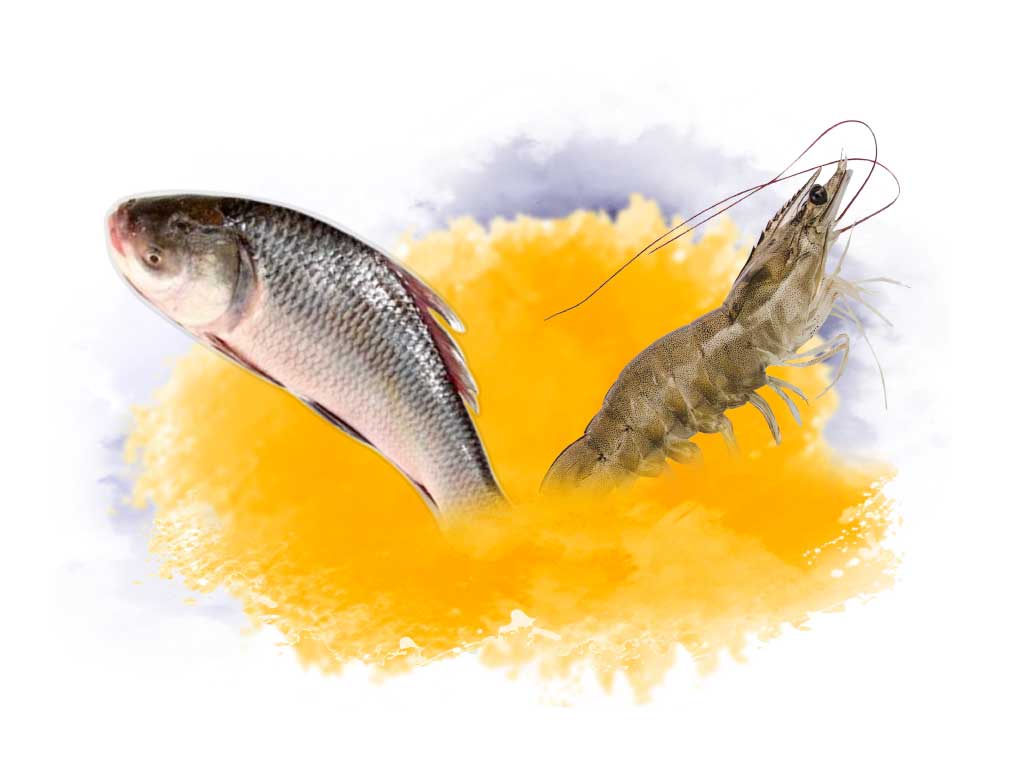Aquaculture
Aquaculture is concerned with ‘the propagation and rearing of aquatic organisms under complete human control involving manipulation of atleast one stage of an aquatic organism's life before harvest, in order to increase its production’. Fishery catches from the marine environment have been steadily declining in many parts of the world due to over-exploitation and pollution, causing the people to turn towards aquaculture to improve the food production and to contribute for economic development.
During the past 20 years, aquaculture industry has been growing tremendously, especially that of marine fish, shrimps and bivalves in addition to freshwater fishes and prawn. Penaeid shrimps are among the most important and extensively cultured crustaceans in the world (> 60 countries). In general global aquaculture, in particular India, has made encouraging progress in the past two decades producing significant quantities of food, income and employment.

Aquaculture, particularly, tiger shrimp Penaeus monodon culture, has extensively been practiced all along coastal regions of India followed by white leg shrimp Litopenaeus vannamei and giant fresh water prawn Macrobrachium rosenbergii and many fish species in freshwater and Brackishwater regions. Increased production is being achieved by expansion of culture areas and the use of modern techniques. But, this development of aquaculture has led not only to severe disease problems but also alteration of the quality of our natural habitats through increased effluent discharges from aquaculture systems, which contain high quantities of hither-to-non-existent materials of both organic and inorganic forms.
Disease outbreaks are being increasingly recognized as a significant constraint to aquaculture production, trade and are affecting economic development of the sector in many countries of the world. Disease is now considered to be the most limiting factor in the shrimp and scampi culture sub-sector.
Need for new approaches towards health management
Till recent past, it is observed that sustainable development of aquaculture sector can be achieved by feeding aquaculture animals with good quality feed supplements and adopting eco-friendly aquaculture practices by minimizing impact on the surrounding environment.
Environmental factors and poor water quality resulting from increased effluent discharge, movement of aquatic animals, inadequate farm management, rapid proliferation of farms, etc., have been implicated in major disease outbreaks occurring in epizootic conditions. However, the underlying causes of such epizootics are highly complex and difficult to pinpoint. An understanding of the relationship between Host, Pathogen and Environment is important in this regard. Since aquatic animal disease is the end result of a series of linked events, treatment of disease should go beyond consideration of pathogen alone. Conventional approaches have so far had limited success in the prevention or cure of aquatic disease. Recent experience in trying to control disease outbreaks clearly demonstrates the importance of the linkage with other components of the production system, including the need for broader ecosystem management approaches to control farm-level environmental deterioration. This situation can be reinforced by taking preventative measures against the introduction of pathogens—the “Systems Management Approach” (SMA) through Biosecurity, Biotechnology along with Efficient Management of Water Quality Enhancing Procedures and Supporting the culture with Feed Supplementation through required Nutritional Products for sustained aquatic animal health.
The emphasis of SMA, Biosecurity and Biotechnology is to be an integral part towards better management for prevention, which is likely to be more cost effective than cure, involving both on-site management and the management of the environment where farms are located.
Global awareness
During the last decade, issues such as sustainable development, environmental interactions and long-term sustainability of aquaculture received increasing attention at Local, National and International levels. One of the most widely accepted criteria for sustainable development is that development activities should not exceed the carrying capacity of the environment. Creating an "enabling environment" for sustainable aquaculture development can be achieved through Biosecurity and Biotechnology approaches
Neospark is a leading manufacturer of Biosecurity, Biotechnology and other unique Aquaculture Formulations which are eco-friendly for profitable operations from crop to crop. The quality of aquaculture products is linked inextricably to the overall quality and wellbeing of the aquaculture systems of both hatchery and farm environment. Aquaculture products manufactured by Neospark are in different dosage forms for convenient use.
Veterinary Pharmaceuticals
Feed Supplements, Feed Additives, Premixtures
Biosecurity
Veterinary Pharmaceuticals
Powders
- Address
- Neospark Drugs and Chemicals Private Limited Corporate Center,
241, B.L. Bagh, Panjagutta,
Hyderabad- 500 082,
Telangana, India.
- Product Groups
- Poultry
- Large Animal
- Aquaculture
- Feed
© 2025 Neospark Drugs and Chemicals Private Limited